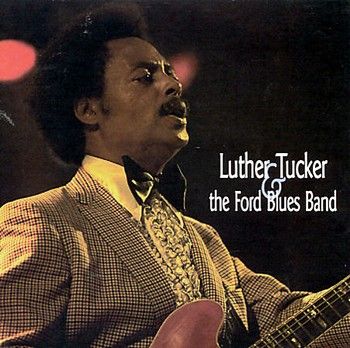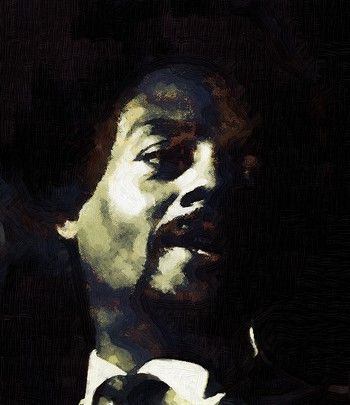
Luther Tucker - Luther Tucker and the Ford Blues Band - 1995 - Blue Rock'It
Although the late, Memphis born Luther Tucker may be an unfamiliar name to many music fans, his stylish rhythm-like guitar playing featured on many great blues recordings. His great guitar skills were taught to him by Robert Jr. Lockwood, who was himself tutored by the great Robert Johnson. The blues circle will never be broken. Luther worked with Little Walter's band, and up to the mid sixties, worked with artists like Muddy Waters, Sonny Boy Williamson II, Otis Spann, Jimmy Rogers, and Otis Rush. He later worked with the James Cotton Blues Band, John Lee Hooker's Coast-to-Coast Band, Matt "Guitar" Murphy, and of course, The Ford Blues Band. Patrick Ford met Luther in 1971, and The great Robben Ford was an admirer of Luther Tucker's guitar style and tone. The Ford Blues Band remained great friends of Luther until his death. It's a shame that this is the only album the band recorded with Luther. Unfortunately, Luther was an overly generous and modest man, and it is said that he partly wrote songs for some artists who never credited him. He hated to let anybody down, which often led to his double-, even triple-booking gigs for the same time. He was also a great party-goer, and used drugs to maintain his hectic lifestyle. This, ultimately led to his death from a heart attack in 1993, aged 57. Part of the this album is studio recorded and part is from a concert in Bremen, Germany, recorded one week before Luther died. Luther Tucker was a very talented bluesman, and sadly, his solo output is very limited - (two albums). However, he should be remembered as one of the great Chicago bluesmen. Buy his "Sad Hours" album, recorded in Austin in 1990, and released three months after his death
TRACKS / COMPOSERS
1. L.T. Shuffle - Luther Tucker
2. Mean Old World - Little Walter
3. Playboy - Luther Tucker
4. Luther's Lament - Patrick Ford/Luther Tucker
5. Littly Bitty Man - Luther Tucker
6. Sad and Lonely - Patrick Ford/Luther Tucker
7. Cha-Cha-la-Tucker - Luther Tucker
8. Worried Life Blues - Big Maceo Merriweather
9. Cleo and Back Again - Luther Tucker
10. Radio Interview With Luther - Luther Tucker
MUSICIANS
Luther Tucker (vocals, guitar)
John Wedemeyer (guitar)
Willie Riser, Stanley Poplin (bass)
John R. Burr (keyboards)
Patrick Ford (drums)
Andy Just (vocals, harmonica)
LUTHER TUCKER BIO
Guitarist Luther Tucker was born on January 20, 1936, in Memphis, TN, but relocated to Chicago's South side when Tucker was around seven years of age. His father, a carpenter, built Tucker his first guitar and his mother, who played boogie-woogie piano, introduced him to Big Bill Broonzy around that time. He went on to study guitar with Robert Jr. Lockwood, for whom he had the greatest admiration and respect. Tucker worked with Little Walter Jacobs for seven years and played on many of Walter's classic sides. He also recorded with Otis Rush, Robben Ford, Sonny Boy Williamson II, Jimmy Rogers, Snooky Pryor, Muddy Waters, John Lee Hooker, Elvin Bishop, and James Cotton. In the mid-'60s, Tucker was featured in the James Cotton Blues Band and traveled with that band extensively. He relocated to Marin County, CA, in 1973 and formed the Luther Tucker Band. He played in clubs in the San Francisco Bay area until his death on June 18, 1993, in Greenbrae, CA. Luther Tucker, who was soft-spoken and even shy, was one of a handful of backup artists (the Four Aces/Jukes were others) who helped to create and shape the small combo sound of Chicago blues. Unfortunately, they seldom get much credit. Yet, as the history of Chicago blues gets written, there will be more and more time to discover the wonderful understated rhythmic guitar mastery of Luther Tucker. © Michael Erlewine, allmusic.com

BIO (WIKIPEDIA)
Luther Tucker (January 20, 1936 — June 18, 1993 was an American blues guitarist. While soft spoken and shy, Tucker made his presence known through his unique and clearly recognizable guitar style. Tucker helped to define the music known as Chicago Blues, but played everything from blues to soul, rock, jazz and gospel, when given the chance. While never achieving the fame and notoriety of some of his contemporaries he was considered a great guitarist whether playing his own lead style or playing on the recordings of B. B. King, Mel Brown, Pat Hare, or Elmore James. He is considered one of the most prominent rhythm guitarists of Chicago Blues along with Eddie Taylor, Jody Williams and Freddie Robinson. Tucker was born in Memphis, Tennessee. His father, a carpenter, built Tucker his first guitar, but his first real guitar was a Sears Silvertone that his mother got him to keep him out of trouble. His mother, who played boogie-woogie piano, introduced him to Big Bill Broonzy and to Robert Lockwood Jr., the stepson to Robert Johnson, usually acknowledged as "King of the Delta Blues". Tucker went on to become Robert Jr.'s protégé, a guitarist and an individual for whom he had the greatest admiration and respect. In fact, Tucker always referred to him as "Mr. Robert Jr. Lockwood". Tucker's family moved from Memphis to Chicago when he was a teenager and his teenage contemporaries and friends with whom he traded licks, shared ideas and played included Freddie King, Magic Sam and Otis Rush. In 1952 he began playing with his uncle, J.T. "Boogie" Brown, saxophonist, studio musician, and sideman to slide guitarist, Elmore James. Tucker was soon back with Mr. Robert Jr. Lockwood, who was one of the most sought after sidemen and studio guitarists on the Chicago blues scene. Robert Jr. went to the musician's union asking that Tucker be allowed to play in clubs, and reassured the Union that he would act as a guardian to him and keep the 16-year old Tucker out of trouble. Robert Jr., who was capable of playing Delta Blues had been B.B. King's rhythm guitarist in 1948-1949 and brought a unique jazz style to (the new style known as) Chicago Blues. A tough task master, Robert Jr. drilled in to Tucker everything from minor diminished ninth and thirteenth chords to big bar-chords and the subtle nuances of jazz guitar. Initially, Robert Jr. played lead guitar and Tucker played bass on a tuned-down six-string guitar (the Fender bass had not yet been invented) or Tucker would play rhythm guitar. Tucker learned to read music and began working as a studio guitarist at an early age. If someone wanted Robert Jr., they also got Tucker as part of the package. They worked with Little Walter off and on for seven years. First, as part of a twosome with Robert Jr., and later as a lead guitarist, Tucker recorded on numerous classic sides behind [(Little Walter)], Sonny Boy Williamson II, Jimmy Rogers, Muddy Waters, and [(Howlin' Wolf)]. He also recorded with Otis Rush, Snooky Pryor, and after moving to the West Coast, John Lee Hooker, Robben Ford, and Elvin Bishop. In the late 1960s Tucker had been working in Muddy Waters' band along with harmonica player, James Cotton, and drummer, Francis Clay. In 1968, a cooperative band was put together composed of Tucker on guitar; drummer, Sam Lay (best known for his work with Paul Butterfield); bassist and alumni of Howlin' Wolf's band, Bobby Anderson; Alberto Gianquinto, a pianist equally comfortable playing jazz, blues or classical music; and harmonica man and singer, James Cotton. First night out, the emcee at the club asked the band's name so he could announce them. For lack of a name, one of the band said, The James Cotton Blues Band. The name stuck. After a while, Sam Lay was replaced by Francis Clay. Clay, a veteran of Dizzy Gillespie's and Cab Calloway's big bands, Jay McShann's group and Muddy Water's band, brought a new dimension to the band and Tucker further developed his skills, playing soul tunes and jazz arrangements, utilizing the octave, minor and diminished chords he had learned from Robert Jr. The group traveled the country from Fillmore West, in San Francisco to Fillmore East in New York, and on to Great Britain, Europe and other points, sharing the stage with the biggest rock acts of the 1960s and 70's. The band spent a great deal of time in Northern California and in 1973 Tucker left The James Cotton Blues Band and relocated to the town of San Anselmo, California. For several years he worked with John Lee Hooker's band, Grayson Street, L.C. "Good Rockin'" Robinson, and as a house musician at Clifford Antone's club in Austin, Texas. He finally formed the Luther Tucker Band where he also became known as a very competent and soulful singer. He played in clubs in the San Francisco Bay Area until his death. Tucker played at the San Francisco Blues Festival in 1973, 1976, and 1979. He would also play as part of supporting bands behind visiting friends and bluesmen including Fenton Robinson, Freddie King and Jimmy Reed. Luther Tucker died of a heart attack in June, 1993 in Greenbrae, California, at the age of 57. His body was returned to Chicago, where he is buried in Restville Cemetery in an unmarked plot. He recorded two albums, one incomplete, both released following his passing.





1 comment:
LINK
p/w aoofc
Post a Comment